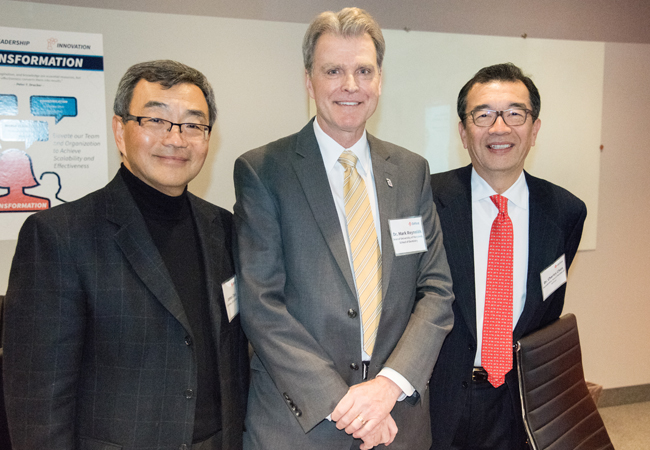The University of Maryland School of Dentistry (UMSOD) has joined with DrFirst, the leading independent provider of e-prescribing and medication management systems in the United States, to fight the opioid crisis that is afflicting the country and the state.
This is one of several recent developments involving dentistry and the battle against addiction. The latest developments occurred March 26, with the announcement of a new policy by the American Dental Association. The association stated support of mandates on prescription limits, continuing education, and dentists registering with and utilizing Prescription Drug Monitoring Programs (PDMPs).

Left to right, James F. Chen, MS, chairman, chief executive officer, and founder of DrFirst; Mark A. Reynolds, DDS, PhD, MA, dean and professor of the UM School of Dentistry (UMSOD); and Charles Chen, DDS, a member of the UMSOD Dean's Faculty.
On March 16, an event held at the Rockville, Md., headquarters of DrFirst featured a briefing for Maryland Lt. Gov. Boyd Rutherford, JD, MA, who learned about the collaboration with the school and viewed a demonstration of a PDMP check using the company’s technology. Rutherford chaired the state’s Heroin and Opioid Emergency Task Force that, among other things, recommended requiring PDMP checks as part of the prescribing process to ensure the safe and appropriate use of opioids.
He was greeted by Mark A. Reynolds, DDS, PhD, MA, dean and professor of the UMSOD, and other health care leaders who had been invited by DrFirst to hold a roundtable discussion with the lieutenant governor on curbing opioid addiction.
“The University of Maryland School of Dentistry is the first dental college in the world. We would like to be the first in leading the charge to help dentists learn more accountable pain management,” Reynolds said. He reminded the group that many patients seek dental care because they are in pain. After treatment, they leave with pain. “It is the nature of the profession. We are making great strides to move forward,” he said.
“About 12 percent of the immediate-release opioids in the United States are prescribed by dentists. That percentage is higher among younger adults for a variety of reasons. So, the need is there,” said Reynolds, a periodontist at the school’s clinics in Baltimore.
The partnership between DrFirst and the UMSOD provides a unique opportunity to address the opioid crisis. For one, a majority of dental practitioners in Maryland are UMSOD alumni. For another, Reynolds said: “As the largest oral health practice in the state of Maryland, we have the opportunity to model best practices for emerging large, multi-group practices within the state and across the nation.”
The UMSOD provides care to Maryland residents at its Baltimore location as well as at three off-campus sites in Westminster, Md., Perryville, Md., and Frederick, Md., where the school partners with other health care providers. In 2017, the school provided treatment to more than 26,000 patients in the Baltimore and off-site clinics during more than 111,000 patient visits.
“We are preparing the next generation of oral health practitioners to integrate prescription drug monitoring into the clinical setting to better inform their prescribing practices,” said Reynolds, expressing gratitude for DrFirst’s in-kind donation to the University of Maryland, Baltimore’s Catalyst campaign that will enable dental students to utilize the new technology.
The school's adoption of DrFirst's mobility suite, including iPrescribeSM and Backline, puts academia at the forefront of the fight against opioid addiction by providing tools and education for future oral health practitioners and UMSOD alumni to access more accurate patient medication history and opioid prescribing data.
"DrFirst is committed to helping Maryland overcome its opioid crisis, especially its opioid death rate, which is growing faster than the national average," said G. Cameron Deemer, president of DrFirst. "We welcome our relationship with the University of Maryland School of Dentistry and are excited by its commitment to lead the charge to enable informed prescribing among the Maryland dental community, to prepare them to successfully meet the PDMP mandate, and to drive deeper collaboration within the dental community."
The PDMP mandate, effective July 1, 2018, requires health care providers to check medication history via the online PDMP registry before prescribing opioids. Maryland joins 40 other states in requiring PDMP checks.
The lieutenant governor’s task force proposed 33 recommendations, including some such as mandatory PDMP utilization that Rutherford characterized in his roundtable remarks as “predominantly prevention.”
“But prevention is education,” he continued. “Some of it is educating the doctors, the prescribers, the dispensers, the pharmacists, all those involved with the process. And then educating the public.”
Beyond dentistry, the roundtable drew representatives of MedChi, which is the Maryland State Medical Society; and of the Chesapeake Regional Information System for of Patients (CRISP). The latter is the regional health information exchange serving Maryland and the District of Columbia. DrFirst’s collaboration extends to both.
Gary W. Pushkin, president of MedChi, said using DrFirst’s technology makes it quicker to check the database during the workflow. “This is a tool that when I am seeing patients, it makes it very easy,” he said. As the opioid crisis has worsened in recent years, he said, prescribers have learned they’re “not very good at guessing” who is the problem patient. “So … we need to be using this every time that we are writing a prescription for narcotics instead of trusting our instincts.”
With iPrescribe and Backline, practitioners have accurate medication history at their fingertips, as well as access to their peers for consultation to support patient safety appropriately. Gaining this knowledge immediately improves dentists' ability to make the most informed decisions around patient safety and opioid prescribing efficacy.
Together, DrFirst's tools improve visibility into patient opioid use history, encourage compliance with Maryland's PDMP check requirements, identify all medication interactions, monitor patient fill history, enable consultation with peers and staff, and effectively engage patients before and after office visits.



